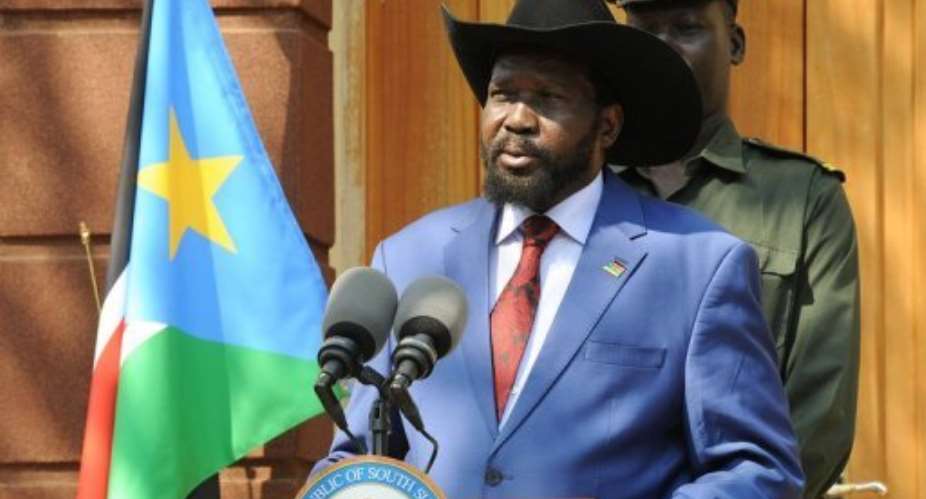JUBA (AFP) - Sudanese aircraft and ground troops attacked multiple positions in South Sudan's oil rich border regions Monday but were repulsed after fierce battles, Southern President Salva Kiir charged as he warned of war.
"This morning the (Sudanese) airforce came and bombed... areas in Unity state," Kiir said, adding his troops had fought back and taken the key northern oil field of Heglig.
"After this intensive bombardment our forces.... were attacked by SAF (Sudan Armed Forces) and militia," he added, speaking at the opening of a ruling party meeting in the southern capital Juba.
"It is a war that has been imposed on us again, but it is they (Khartoum) who are looking for it," said Kiir, adding that he did not want conflict to resume.
However Sudanese army spokesman, Sawarmi Khaled Saad, said only "limited clashes" had occurred between his forces and those of South Sudan along the disputed border between the two countries.
Saad also claimed rebels from Sudan's war-torn western Darfur region, the Justice and Equality Movement (JEM) had "exploited this clash" to target the armed forces in the Heglig area. They were repulsed, he said.
Border tensions have mounted since South Sudan split from Sudan in July after decades of war to become the world's newest nation, with each side accusing the other of backing proxy rebel forces against it.
Khartoum threatened retaliation in February and early March after accusing the South of backing rebel attacks in disputed border areas, amidst a furious dispute over oil transit fees with Juba.
Air strikes followed on an oilfield in the South's Unity State, an attack Juba blamed on Khartoum's forces.
Kiir said Southern troops, the Sudan Peoples Liberation Army (SPLA), had on Monday driven northern forces back across the undemarcated border and seized Khartoum's Heglig oil field, parts of which are claimed by both sides.
"They attacked our forces and our forces were able to repulse them.. and they ran," Kiir added. "The last information that came to me was that our forces have also taken over Heglig."
South Sudanese army spokesman Philip Aguer said that fighting was ongoing when he last spoke to frontline troops, just over an hour before dusk.
"There are casualties but we don't have the full report... at the last communication, which is very difficult, there was still fighting," Aguer said, but also added the army was not wanting the clashes to spiral into war.
"This was an act of self-defence on behalf of the SPLA, and we still commit ourselves to all the security agreements between us -- despite all this fighting we are committed to peace," Aguer added.
He claimed a full Sudanese army battalion -- potentially up to 1200 soldiers -- had crossed the border before being pushed back, claims that could not be independently verified.
The fighting appears to dash earlier hopes the rival nations could solve their differences following months of stalled talks and inflammatory rhetoric.
A South Sudanese delegation visited the Sudanese capital Khartoum last week to invite its "brother" leader, Sudanese President Omar al-Bashir, to an April 3 summit with his counterpart Kiir in Juba.
Officials in Khartoum say it is not yet certain that he will make the trip.
Talks are stalled over oil transit fees: South Sudan took three quarters of Sudan's oil reserves, but all pipeline and export facilities are controlled by the north.
The South halted oil production in January -- stopping the flow of the resource that accounts for 98 percent of government revenue -- after Juba accused Khartoum of stealing $815 million worth of crude oil.
The South has demanded that any deal includes settlement on the undemarcated border, parts of which cut through oil fields, as well on Abyei, a Lebanon-sized region claimed by both sides but occupied by northern troops.





 Hotels saga: Don’t play ‘chaskele’ with our pension funds, we'll stage mother of...
Hotels saga: Don’t play ‘chaskele’ with our pension funds, we'll stage mother of...
 Martin Amidu’s petition part of a grand scheme to remove Kissi Agyebeng – Sammy ...
Martin Amidu’s petition part of a grand scheme to remove Kissi Agyebeng – Sammy ...
 Dumsor: I sleep beside my ‘freezer’ with the door open, use my wife’s rechargeab...
Dumsor: I sleep beside my ‘freezer’ with the door open, use my wife’s rechargeab...
 You’ll all receive the word here ‘by force’ — Prophet Oduro to womanisers, adult...
You’ll all receive the word here ‘by force’ — Prophet Oduro to womanisers, adult...
 I gathered a team, ‘scared’ Togolese from participating in 2016 elections — Hope...
I gathered a team, ‘scared’ Togolese from participating in 2016 elections — Hope...
 Medikal and Fella's marriage was bound to fail — Maurice Ampaw
Medikal and Fella's marriage was bound to fail — Maurice Ampaw
 May we be granted travelling mercies this election period — Alan reacts to accid...
May we be granted travelling mercies this election period — Alan reacts to accid...
 Bawumia has proven to be the worst Vice President; blame him for the collapse of...
Bawumia has proven to be the worst Vice President; blame him for the collapse of...
 Demonising EC is a threat to Ghana's democracy — Atik Mohammed
Demonising EC is a threat to Ghana's democracy — Atik Mohammed
 Bawumia becoming President will be one of Ghana's 'best things' to happen — Mira...
Bawumia becoming President will be one of Ghana's 'best things' to happen — Mira...
